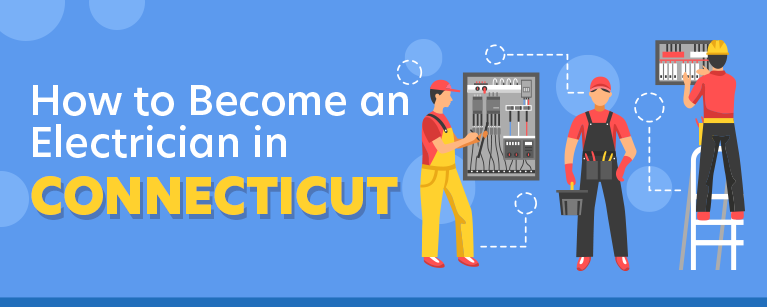
Connecticut is witnessing a steadily growing demand for electricians.
If you’ve ever thought about getting into the electrical industry, now is the perfect time!
With an excellent starting salary, more demand than there is supply, and tons of job opportunities, becoming an electrician in Connecticut is a great idea for anyone searching for a secure career path.
If this sounds like you, then keep reading to discover how you can become an electrician in Connecticut.
Table of Contents
Electrician Job Duties and Skills in Connecticut
The Connecticut Labor Market states that the typical electrician will have to:
- Plan the necessary layout and plan the installation of electrical wiring or equipment based on job specifications, local codes, and more.
- Connect wires to circuit breakers, transformers, and other possible components.
- Test electric systems or test the continuity of circuits in electrical wiring, equipment, fixtures, ore more.
- Use testing devices, such as voltmeters or oscilloscopes, to ensure the safety and compatibility of the system.
- Use a wide variety of equipment or tools, like power construction equipment, measuring devices, or other power tools.
And more.
Electricians also need to possess some soft skills, such as:
- Resourcefulness
- Customer service
- Dependability
- Networking
- Flexibility
- Teamwork
While you may not possess all these skills at the moment, as long as you’re willing to learn, you should be able to thrive in the electrical industry!
How to Become an Electrician in Connecticut
Do you still want to become an electrician?
Read below to find the steps you need to take to bring you closer to earning your license.
Get All the Necessary Classroom Hours
You must make sure to complete 144 hours of learning in class before you can apply for your electrical license in Connecticut.
Be sure you meet this requirement, or you won’t be able to get your electrical license.
Complete The Required Training
Gaining 8,000 hours of hands-on work experience is a necessity if you want to earn your electrical license.
You can make this happen by attending a technical school or a community college or completing an apprenticeship program.
Apply For Your License
Once you are sure you’ve met all the necessary requirements, you’re free to apply for your electrical license!
To do this, you need to take and pass an electrical exam.
Training Programs for Electricians in Connecticut
Here are some institutions in Connecticut that offer electrical training programs.
Lincoln Technical Institute
Lincoln Technical Institute offers the Electrician Training Program and the Electrical and Electronic Systems Technology Program.
The Electrician Training Program promises, “Students will learn electrical, motor, and generator theory, and then use this information as their starting knowledge base to learn about more advanced topics such as electrical codes, telecommunications, residential and commercial wiring, and OSHA requirements.”
With the Electrical and Electronic Systems Technology program, students can “Receive hands-on training using tools to properly install and maintain service panels, lighting fixtures, alarm systems,” and more
The latter program also focuses on teaching students to install and fix fire alarm systems and closed-circuit TV systems.
The program allows students to get trained in both the high and low-voltage aspects of the industry.
Both programs are in-depth and provide many of the necessary classroom and work hours needed for one to obtain an electrical license.
Industrial Management Training Institute
The Industrial Management Training Institute offers a program that promises to prepare students for entry-level career roles such as:
- Electrical apprentice, Residential
- Commercial/Industrial
- Telecommunications Technicians
And more.
Imti.edu states, “The electrical technician program is specifically designed to meet the needs of companies requiring individuals with skills in residential, commercial, and industrial electrical wiring.”
Plus, the student will gain knowledge of burglar and fire alarm systems.
The institute is adamant that the need for well-trained electricians is steadily on the rise and will be for a long time, and they are passionate about being the institute that students attend in order to gain the required knowledge.
Throughout this program, learners will receive an even mix of theory and practical hands-on training.
Porter and Chester Institute
Porter and Chester Institute offers The Career Industrial, Commercial, and Residential Electrician program.
Students taking this course have the opportunity to earn their OSHA-30 certification after completing this twelve-month program and will earn 600 classroom hours and 8,000 hours of electrical work experience.
Porterchester.edu promises to give students a solid foundation of knowledge by teaching students both the technical skills and electrical theory they’ll need to thrive within the industry.
Porter and Chester emphasize that they have Career Service Advisors who are happy to help students find the correct job placements for them.
The career advisors will help students build a resume and practice cover letter writing and the interviewing skills they’ll need to land a job.
| School Name | Address |
|---|---|
| Lincoln Technical Institute | 200 John Downey Dr, New Britain, CT 06051 |
| Industrial Management Training Institute | 233 Mill St, Waterbury, Connecticut 06706 |
| Porter and Chester Institute | 881 Wolcott St, Waterbury, CT 06705 |
Electrician Salaries in Connecticut
Finally, you may be wondering more about what an electrician in Connecticut’s salary may be like.
While it depends on a ton of different factors, you can see how the salary changes based on the city down below.
Annual Salary Range:| Location | Avg. Annual Salary |
|---|---|
| Bridgeport | $75,099 |
| Greenwich | $75,099 |
| Stamford | $75,099 |
| Norwalk | $75,099 |
| Danbury | $72,449 |
| New Haven | $70,722 |
| West Hartford | $70,664 |
| Hartford | $70,664 |
| New Britain | $70,481 |
| Waterbury | $70,351 |
Regional Salary in Connecticut
| Region | Employed | Avg. Annual Salary | Avg. Hourly Pay | Top 10% Annual Salary | Bottom 10% Annual Salary |
|---|---|---|---|---|---|
| Bridgeport-Stamford-Norwalk, CT | 1,200 | $66,480 | $31.96 | $94,520 | $39,030 |
| Danbury, CT | 570 | $64,580 | $31.05 | $93,450 | $37,540 |
| Hartford-West Hartford-East Hartford, CT | 2,500 | $68,560 | $32.96 | $97,460 | $37,810 |
| New Haven, CT | 1,060 | $69,140 | $33.24 | $108,990 | $38,230 |
| Norwich-New London-Westerly, CT-RI | 740 | $63,220 | $30.39 | $83,070 | $40,470 |
| Waterbury, CT | 560 | $71,590 | $34.42 | $102,490 | $41,780 |
* Employment conditions in your area may vary.
Frequently Asked Questions
Can you do electrical work as an electrician without a license in Connecticut?
No, it is illegal to do electrical work with no license in Connecticut.
All electricians have to be licensed by the Department of Consumer Protection.
Can a homeowner do electrical work in Connecticut?
Yes, but only if the owner occupies the home and the home is a single-family household.
What do electricians in Connecticut make per hour?
Anywhere between $20 to $50 an hour, on average.
Most will make around $30 to $35.
Electrician Info by State
- Alabama
- Alaska
- Arizona
- Arkansas
- California
- Colorado
- Connecticut
- Delaware
- Florida
- Georgia
- Hawaii
- Idaho
- Illinois
- Indiana
- Iowa
- Kansas
- Kentucky
- Louisiana
- Maine
- Maryland
- Massachusetts
- Michigan
- Minnesota
- Mississippi
- Missouri
- Montana
- Nebraska
- Nevada
- New Hampshire
- New Jersey
- New Mexico
- New York
- North Carolina
- North Dakota
- Ohio
- Oklahoma
- Oregon
- Pennsylvania
- Rhode Island
- South Carolina
- South Dakota
- Tennessee
- Texas
- Utah
- Vermont
- Virginia
- Washington
- West Virginia
- Wisconsin
- Wyoming









